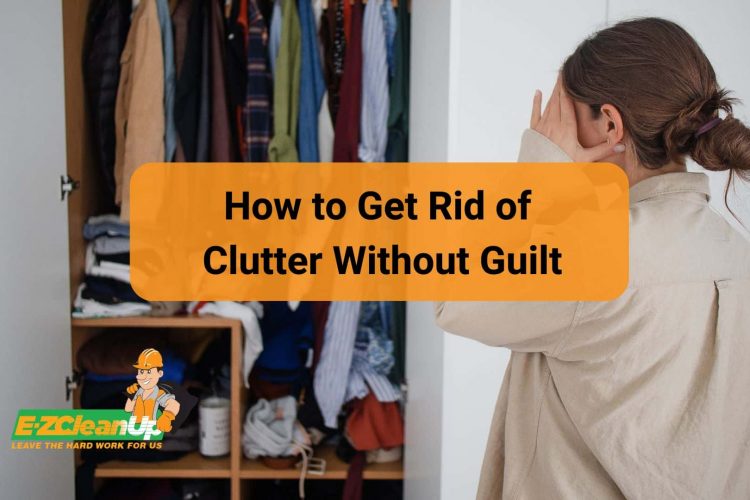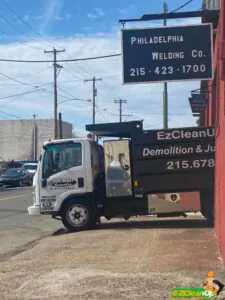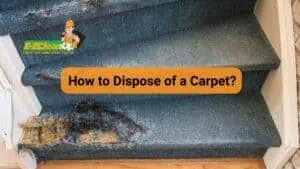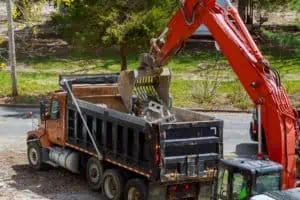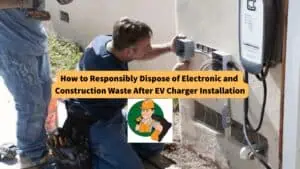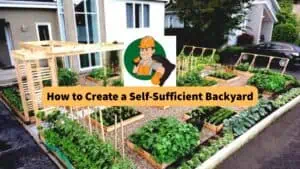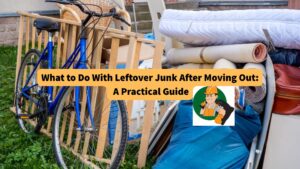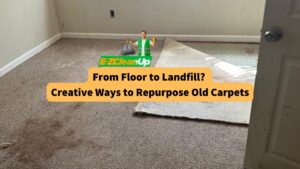Declutter without guilt by focusing on the benefits, starting small, and handling items thoughtfully. Use one-in, one-out to maintain spaces, responsibly donate, and embrace digital backups for keepsakes. Overcome the ‘just in case’ mindset and let go of sunk costs for a tidier home.
If you want to practice the ways on how to get rid of clutter without guilt, read our guide below.
#1: Shift Your Mindset
Clearing out clutter doesn’t just free up space in your home; it can also lift your spirits and reduce stress. But letting go of things can sometimes make you feel guilty. Instead of worrying about what you’re throwing away, focus on the good that comes from it.
More room in your home means more space to enjoy life and less mess to stress about. This positive outlook can make letting go a lot easier and help you feel good about your decision to declutter.
See the Benefits
Getting rid of things you don’t need does more than just clear up physical space—it can make you feel better mentally. A tidy space reduces anxiety and can make your home a more calming place to be.
As you declutter, you might feel proud and accomplished, which boosts your mood and overall well-being. By adopting these mindset changes and practical approaches, you can tackle decluttering without feeling bad about it.
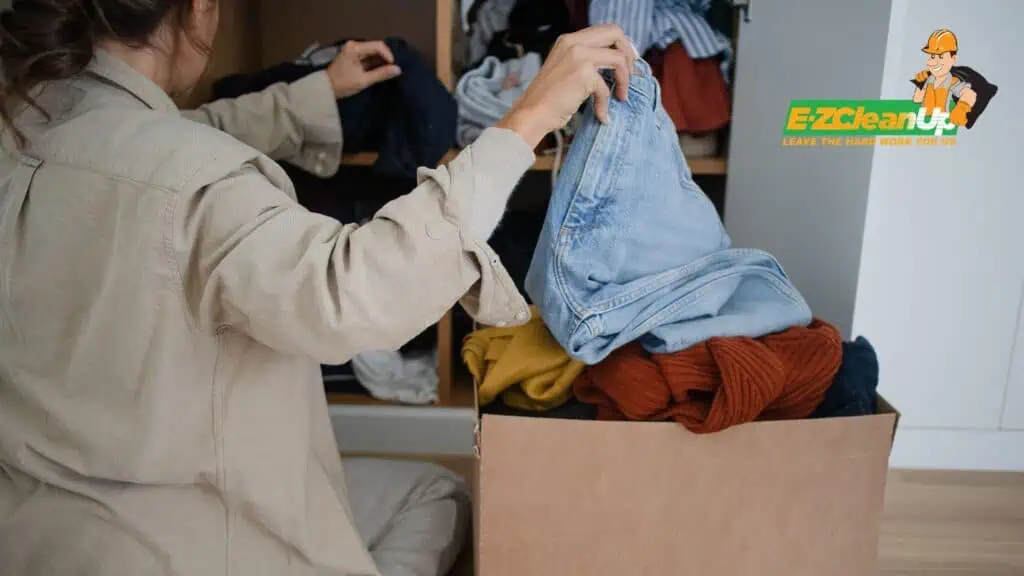
#2: Start Small with Manageable Areas
Starting your decluttering tasks with small, manageable tasks can significantly ease the process. It’s a good idea to begin with less intimidating areas like a single drawer, a desk, or a small closet.
This approach helps you avoid feeling overwhelmed and gives you a sense of achievement early on, which can motivate you to tackle larger areas. By breaking down the task into smaller, more achievable goals, you make the entire process feel more approachable.
Set Time Limits to Stay Energized
To keep your decluttering sessions productive and prevent fatigue, try setting a timer for each session. Limiting yourself to short bursts of 15 to 30 minutes keeps the task from taking over your day and helps maintain your energy.
This method encourages you to make decisions quickly and keeps the momentum going. This makes it easier to see progress without feeling exhausted.
#3: Dealing with Sentimental Items
Sentimental items often pose the biggest challenge when decluttering. They tug at our hearts with memories and emotions. They make it hard to decide what stays and what goes.
Evaluate Emotional and Practical Value
When sorting through sentimental clutter, it’s important to weigh both the emotional value and the practical utility of each item. Ask yourself:
- Do I actually use this?
- Does it bring me joy or just take up space?
- Am I keeping this out of love or obligation?
These questions can help you make thoughtful decisions about whether to keep or part with sentimental belongings.
Digitize to Preserve Memories
For items like old photographs, letters, or important documents, consider creating digital backups. Scanning these items allows you to preserve the memories without taking up physical space in your home.
Digital backups are also safer in the long run, protecting your memories from physical damage like fire or water. With today’s technology, it’s easier than ever to store digital versions securely and conveniently.
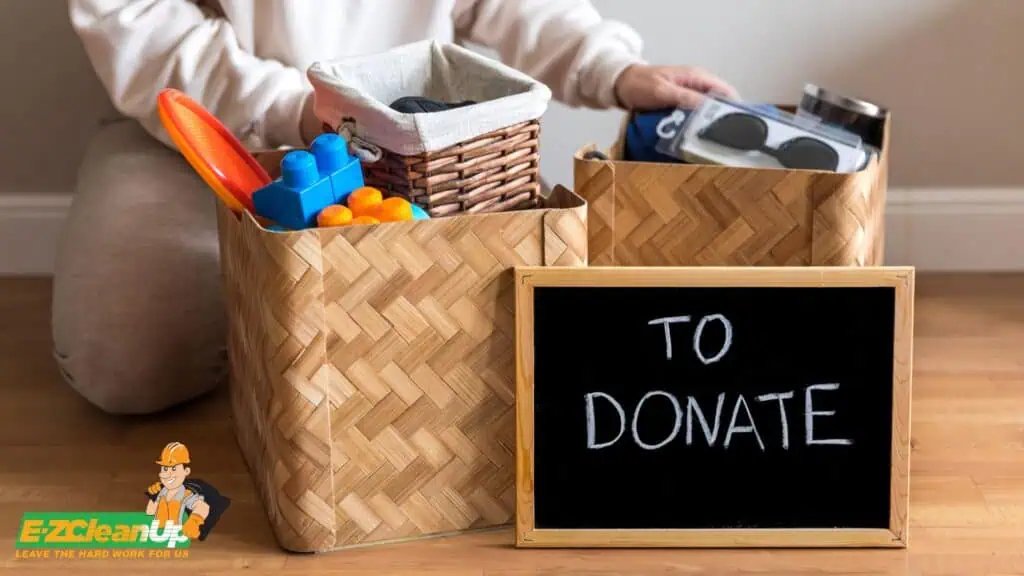
#4: Practice Responsible Disposal and Donation
Donating items that still work well is a great way to help out others and keep stuff out of the dump. When you give things like furniture, gadgets, and clothes to local charities or second-hand stores, you’re doing more than just clearing out your space.
You’re also making it possible for these items to be used again. This is considered good for the planet and helps people find affordable options.
Pick the Right Items to Donate
When choosing what to donate, make sure the items are clean and still work. This makes it more likely that someone else will want to use them. Think about whether you would be happy to receive the item in its current condition.
If the answer is yes, it’s a good candidate for a donation. Local charities and thrift stores often welcome these contributions because they can help them support their causes and serve the community.
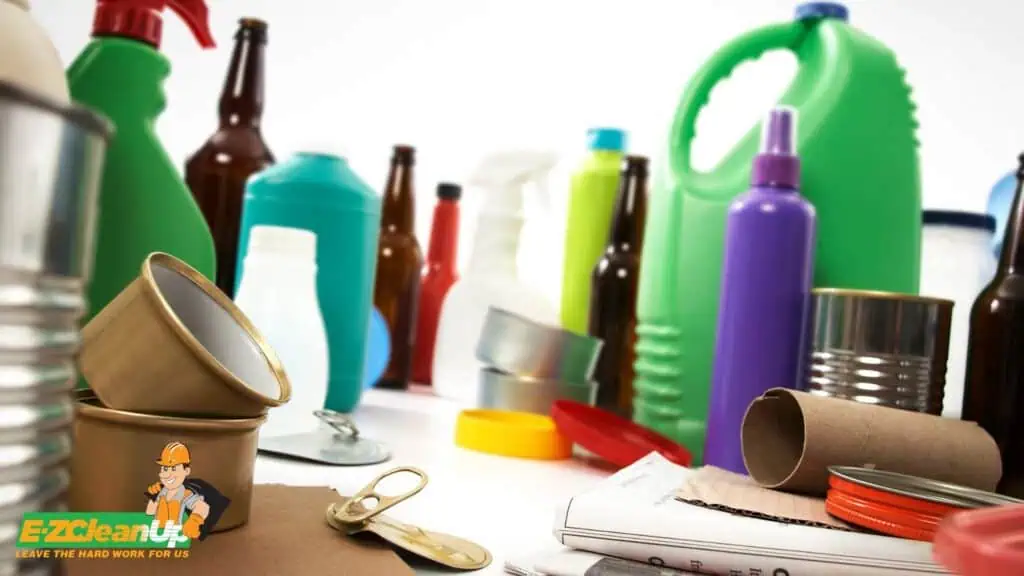
Recycle to Reduce Waste
Recycling is a key part of reducing the impact we have on our planet when we declutter. A lot of what we throw away, like metals, paper, cardboard, plastics, and old electronics, can be turned into new things.
This helps save energy and resources. It’s important to know what your local recycling program takes and how you should sort your recyclables. For example, you might need to rinse out jars and cans or break down boxes.
For stuff that can’t be recycled—like some electronics or things that could be dangerous, like certain chemicals—look for special places that can handle them properly. These services follow strict rules to make sure that harmful materials are dealt with in a way that doesn’t hurt the environment.
#5: Maintain a Clutter-Free Space
Keeping your home organized and free from clutter can seem like a never-ending battle, but it doesn’t have to be. Using simple strategies can make a big difference.
Follow the One-In, One-Out Rule
The one-in, one-out rule is easy to understand and effective in practice. It’s a simple way to maintain balance and prevent your space from getting overrun with stuff.
Whenever you buy something new, you find something old that you can remove from your home. This could be something you no longer use, need, or want. The goal is to avoid accumulating things that just take up space. This rule keeps your living areas tidy and encourages you to think more about what you buy and keep.
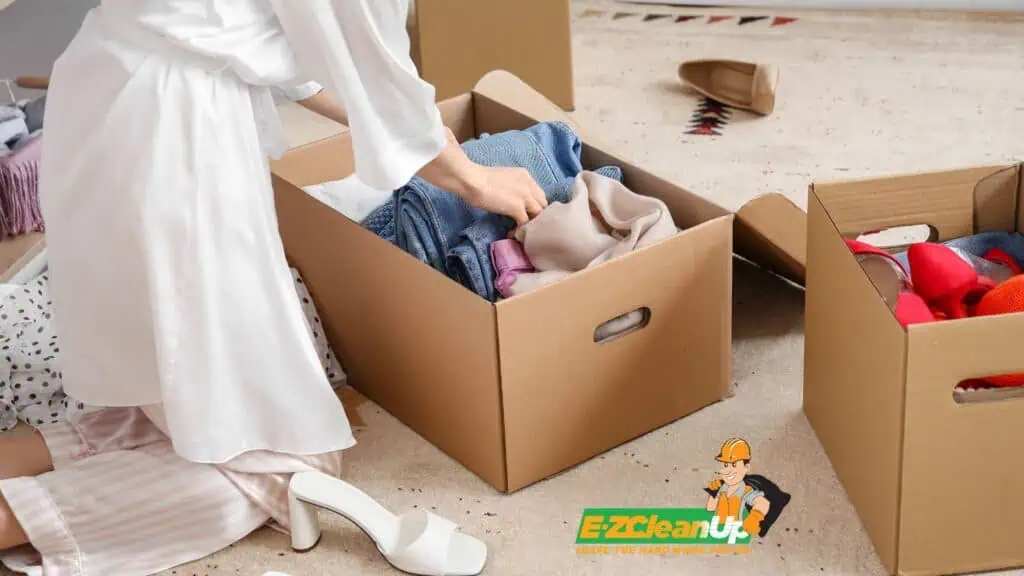
#6: Practice Gratitude for the Items You Choose to Keep
When you decide to keep something, take a moment to think about why it’s important to you. Being thankful for the things you have can change how you see your possessions. It makes you value what you own and reduces the urge to buy more. This mindset of gratitude can make you happier with your home and life.
Acknowledge the Freedom That Comes with Letting Go
Letting go of items that no longer serve you can be freeing. It opens up your home and your mind, making room for new things and experiences. Letting go is about more than just throwing things away—it’s about making space for growth. This can lead to a more intentional and fulfilling lifestyle.
By shedding the excess, you clean your environment and clear your mind. This act of release is crucial for personal growth and can significantly boost your overall quality of life.
#7: Challenge the “Just in Case” Mentality
Holding onto items “just in case” you might need them in the future is a common reason many of us struggle to declutter. It’s easy to think, “What if I need this later?” But this fear can keep us surrounded by things we don’t really use or need.
Focus on the Present Benefits
When you’re deciding whether to keep something, think about how often you use it now, not what might happen. For most items, if you haven’t used them in the past year, it’s unlikely you’ll need them anytime soon.
Realize that the benefits of having a cleaner, more organized space today outweigh the small chance you might need to repurchase something in the future.
Assess Replacement Costs
Ask yourself how difficult and expensive it would be to replace an item if you do end up needing it later. Often, you’ll find that many items are easily replaceable and at a reasonable cost. This makes it easier to let go.
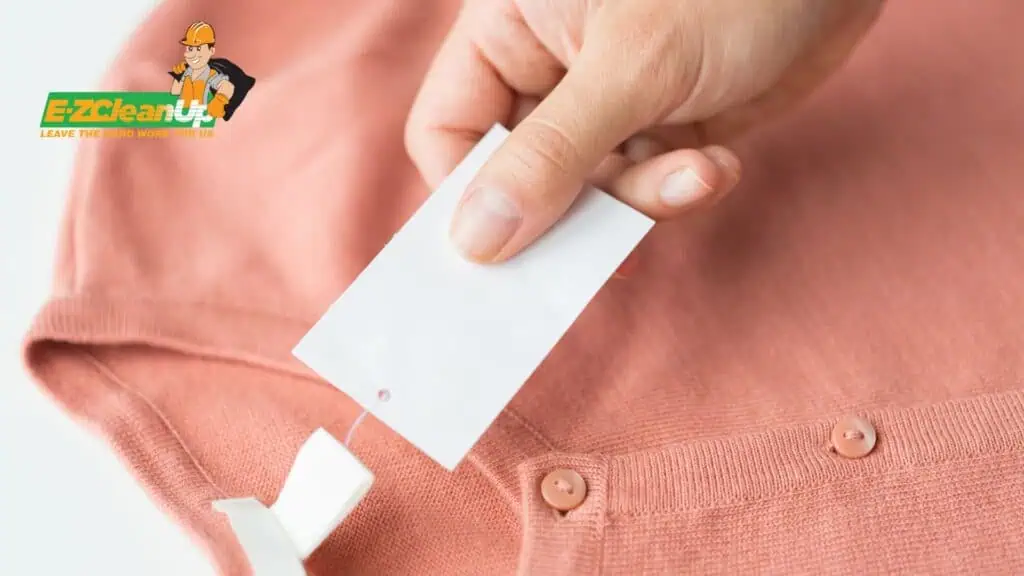
#8: Let Go of Sunk Costs
Letting go of items you’ve spent money on but no longer use can be tough. This is where the concept of “sunk costs” comes in—a financial term that can also apply to decluttering.
“Sunk costs” are past expenses that cannot be recovered. For example, if you bought an expensive jacket that you no longer wear, the money spent is a sunk cost. Holding onto the jacket won’t bring back the money. Instead, it just takes up space and possibly causes stress every time you see it unused.
Embrace the Benefits of Letting Go
Releasing items with sunk costs can free up physical and mental space. It declutters your home. This makes it more organized and peaceful. It also lifts the burden of holding onto things that you don’t use or need.
Practice Makes Perfect
Start small with items that have less emotional and financial attachment to build your confidence. As you practice assessing items for their current value and usefulness rather than their cost, it becomes easier to make decisions about letting go.
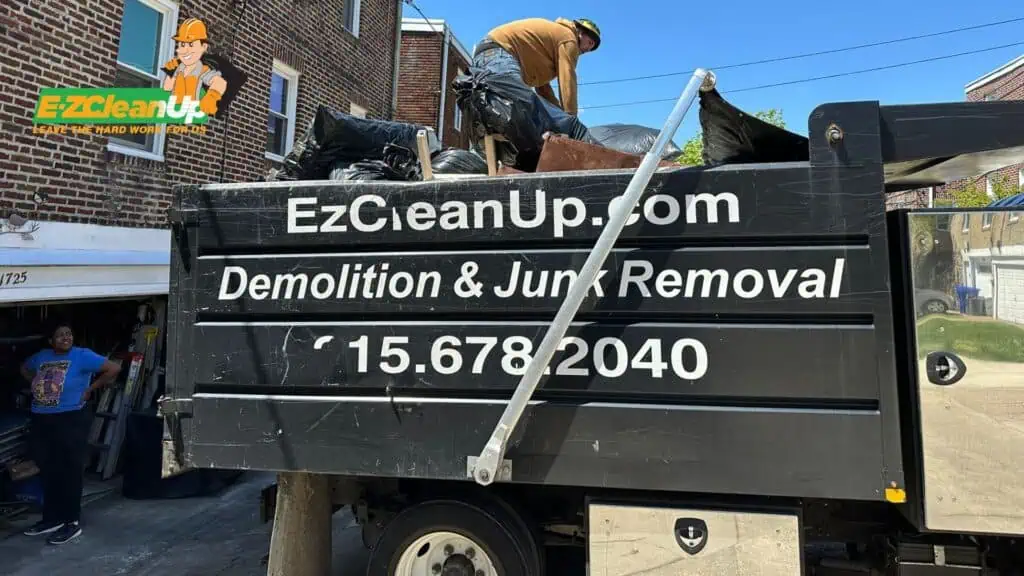
EZ Decluttering Solutions at Your Service
With the right tips on how to get rid of clutter without guilt, anyone can transform their home into a tidy haven. For those items that are too big, too heavy, or too much to handle, EZ CleanUp is at your service.
Reach out to us, and let’s help you make decluttering easier than ever!

